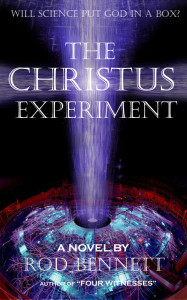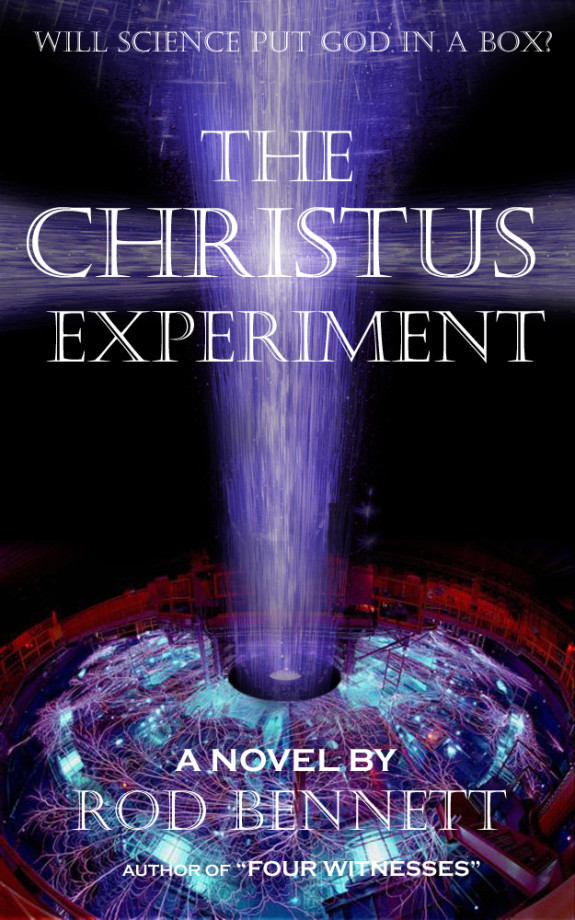The Christus Experiment
by Rod Bennett
CreateSpace, 310 pages, paperback
When I first heard about The Christus Experiment, a sci-fi novel featuring a time-travelling Jesus, I was skeptical. It sounded like a weird blend of H.G. Wells and Dan Brown, covering science and faith and getting both wrong. But then I noted the author, Rod Bennett. Rod previously wrote Four Witnesses: The Early Church in Her Own Words (Ignatius Press, 2002), which was an excellent book that brought the early Church to life through creative narratives. The fact that Rod authored The Christus Experiment gave it much more clout. For Rod is no Dan Brown, and I mean that as a compliment.
 But it was Mark Shea’s endorsement that really piqued my attention. Mark described the book as “a lulu of a sci-fi story that I stayed up later than I should have reading. I so want to see a movie made of this. It would rock the house. Rod Bennett is one of the most original minds going right now.”
But it was Mark Shea’s endorsement that really piqued my attention. Mark described the book as “a lulu of a sci-fi story that I stayed up later than I should have reading. I so want to see a movie made of this. It would rock the house. Rod Bennett is one of the most original minds going right now.”
The Christus Experiment centers on multi-billionaire Anson MacDonald, who hatches a plot to visit first-century Jerusalem, find and kidnap Jesus Christ, and bring him back to our day. Like many of the other characters, including a drug-addicted, wheelchair-bound psychic, MacDonald is a wounded skeptic interested to see whether Jesus is truly a revolutionary miracle-worker or just a disappointing charlatan. He gathers the greatest physicists, religious experts, and computer scientists money can buy and creates a time portal in the middle of the desert to carry out his plan.
Much like C.S. Lewis’ novel, That Hideous Strength, Rod uses story to explore weighty questions about faith, doubt, and the power of science. His complex characters, who are anything but cliché, balance these serious questions with plenty of dry humor. Readers will delight in Rod’s trio of “expert theologians,” who deconstruct, demythologize, and explain-away Jesus’ divinity even while speaking to him face-to-face. They reminded me of the preacher who, when given the choice of entering heaven or hearing a sermon on heaven, chose the sermon.
Rod most notably succeeds where many others have failed: bringing Jesus to life through fiction. It’s tough to capture Jesus’ otherworldliness and gravitas without coming across as trite. Yet just as Lewis did with Aslan in The Chronicles of Narnia, Rod does with Jesus in his book. His depiction is strange and amazing, soft and strong, earthy and transcendent—the right balance of God and man.
In addition to its religious themes, The Christus Experiment also deals with scientific questions like whether history can be changed. Here Rod’s characters are split. Some believe it can and want to kill Jesus in order to stomp out Christianity before it ever takes root. Others want to restore Jesus to his first-century home, afraid of rupturing history and jeopardizing their own existence. The book never fully resolves the question, but lets the reader answer it for himself.
It should be noted that The Christus Experiment is self-published, though I didn’t spot any spelling or grammatical mistakes. Also, for some reason the print version is only available in large-print format and features no page numbers—only chapter and section numberings like the Bible.
Yet overall, the book is just as Mark described it. It’s smart, gripping, adventurous and full of important questions and fascinating characters. If you liked Lewis’ That Hideous Strength, you’ll love The Christus Experiment.
(Check out Jeff Miller’s review over at The Curt Jester.)

